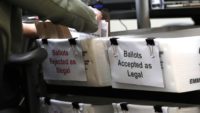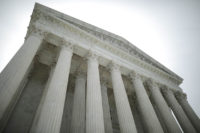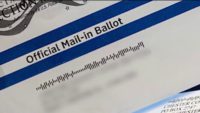Absentee / Mail-in Voting
All states have some form of absentee or mail-in voting due to federal requirements. These voters normally include military and overseas citizens, voters with disabilities and students who reside in a different state. For example, absentee or mail-in ballots are sent to these military and overseas voters 45 days prior to federal elections. However, absentee or mail-in voting is often limited by states to a number of valid excuses based on age, absentee status or an inability to vote on Election Day.
Some states have a greater number of reasons and valid excuses to vote absentee ballots by mail or in-person in an election office. A number of states have no-excuse absentee or mail voting. Lastly, a number of states have implemented an entire method of mail-in balloting that includes return of ballots to secure boxes or by postal mail. Oregon instituted an all-mail-in balloting system in 1998 and other states like Washington and Colorado have instituted similar all mail ballot methods of voting.
Mail-in and absentee balloting provides certain vulnerabilities to the electoral system:
- One stated general purpose for no-excuse absentee or mail ballot voting is to increase convenience and reduce long lines on Election Day. However, “Election Day” has become “Election Month,” which has increased the overall costs of election administration. County election offices that must process a large number of mailed ballots will experience significant delays in releasing official election results. A month or more of voting dramatically increases the overall costs to political campaigns for poll watching and get-out-the-vote efforts prior to Election Day.
- Mail-in ballots are not cast in the secure polling place where precinct poll workers can confirm addresses and verify identification. A great deal of voter fraud and abuse of absentee and mail-in ballots has been documented across the country. Absentee or mail-in balloting may spur a short-term increase in turnout in local elections; however, there is no evidence that voting by mail increases overall turnout for the long term in general elections.
- Absentee or mail-in balloting requires the use of the U.S. Postal Service (USPS) to transmit and return the ballot. This often causes delays to the election office. Citizens in states that use mail-in ballots often authorize the return of ballots to secure mail boxes that voters can use if they distrust the postal service.
A number of states authorize or require in-person absentee voting with verification by voter ID, and some states require a voter ID at the time of absentee or mail-in ballot request or return.
Alternatively, many states that allow absentee or mail-in voting use signature comparison to verify the identity of the voter. Many believe that signature verification is error-prone and not uniformly implemented by election officials across the country. While signature verification does catch a small percentage of invalid ballots or voter fraud, the system often fails to identify a great many irregularities associated with absentee or mail-in voting. Alternatively, many argue that signature verification routinely disenfranchises thousands of voters when it is used to ferret out an invalid signature.
ACRU Commentary
ACRU Action’s Blackwell notes liberal bad behavior creates vote security risk
"The left and their chosen candidates have provided telling examples of their unwillingness to make ethical choices that protect citizens. Proving themselves willing to violate numerous critical social norms, they are unlikely to be concerned with violating just one more," states Blackwell.
Pennsylvania mail ballot problems kept tens of thousands from voting in primary election
To make sure your vote counts, vote in person. Wear your mask, stay six feet behind your neighbors, wash your hands when you’re done, and don’t mail your ballot. With evidence coming in from mail-in ballot fails from several states, USPS admits it cannot handle the load. Because of postal drag, at least 92,000 votes in Pennsylvania’s recent primary were not counted. Don’t let that be you in November.
One of These is not Like the Other
There is a critical difference between an absentee ballot and the new notion of universal vote by mail. One is proven and safe, the other is subject to incompetent processing and open to fraud. Voters and elected officials must understand the enormous difference in order to protect the security our elections.
Inaccurate voter registration is an incubator for fraud
The difference between absentee voting and mail-only voting is that absentee voting requires a request for a ballot, but mail-only voting means a ballot will be sent to a house where a voter once lived. This article provides a great primer on why this is an invitation for fraud, and also uses Honest Elections Project data to show how widespread voter registration inaccuracies truly are.
SCOTUS says “no” to relaxing vote security laws
Alabama has long standing curbside voting rules and identification requirements for absentee ballots that safeguard the votes of its citizens. A group led by the Southern Poverty Law Center demanded these protections be overturned (Covid--the usual excuse) and an Obama appointed state judge agreed. Fortunately, the Supreme Court did not, and Alabama will be able to continue to ensure the integrity of its votes.
ACRU’s Blackwell: Vote fraud against seniors is real, organized, and preventable
Despite prosecutions and public stories identifying vote fraud activists targeting seniors, many in our media and political class continue to deny that our elderly population can be singled out for vote manipulation and suppression.
News
Voters who want to vote in person forced to use Postal Service
The Republican governor of Missouri signed a law in June allowing people receiving mail-only ballots to return them in person, as some voters prefer dropping off ballots instead of standing in line during COVID. It required signature validation. A liberal group sued, and won at the appeals level. Now people who have thought since June that they could hand drop their votes are subject to the whims and inefficiencies of the US Postal Service.
Michigan Governor Whitmer is an executive-level vote fraud activist
With bipartisan support, two vote security measures recently passed the Michigan House and landed on Democrat Governor Whitmer’s desk. She then vetoed these bills - they would make it illegal to request more than one ballot, or to fill out someone else’s ballot without their knowledge. In addition to being a COVID crisis tyrant, she’s a vote fraud enabler. It’s just that simple; and disgraceful.
Postal workers at the center of too many discarded ballot stories
It’s all we can do to keep up with all the stories of eagle-eyed citizens finding discarded absentee ballots in trash cans, ditches, and postal worker garages. The latest, from Kentucky, documents over 100 ballots in a dumpster. These are the ballots that were found—what about the ones that are now in a landfill? Not only can your vote be stolen; it can be discarded. Vote in Person!
California voter rolls used for unsolicited ballots are a complete mess
Since liberal Democrat California Governor Gavin Newsom unilaterally decreed that California would be an unsolicited mail ballot state, the state’s non-partisan watchdog, Election Integrity Project, has sent every notice possible short of carrier pigeon to the Governor and his Secretary of State sharing research that shows mail ballots will go to the moved, the deceased, those over 105 years old, with multiple ballots going to thousands of individuals. They tried again this week, and their findings are disturbing.
Frivolous Ballot Cheatin’ Lawsuit Abuse Lists
If you can’t win an election with votes, you use COVID to pretend people can’t vote in person and try to change rules that make it easier to cheat or mishandle ballots. That is exactly what the American left is doing. As of today, there are 300 court cases in 44 states of liberal groups trying to loosen ID requirements, extend voting, create mail-only schemes. You can use this super simple Stanford-MIT case tracker to find out exactly what you need to be against in your state.
Official who sent ballots to dead people claims it’s their family’s fault
Government has software that can track down you down in an instant if you owe the IRS or didn’t pay a speeding ticket. When a person dies, the funeral home automatically notifies Social Security. But in response to a complaint from Ms. Carolyn Quinn, who received ballots for her two deceased parents, an election clerk in Union County, NY claims the family should have notified her office directly. Arrogance and avoiding responsibility is no friend to vote integrity.












